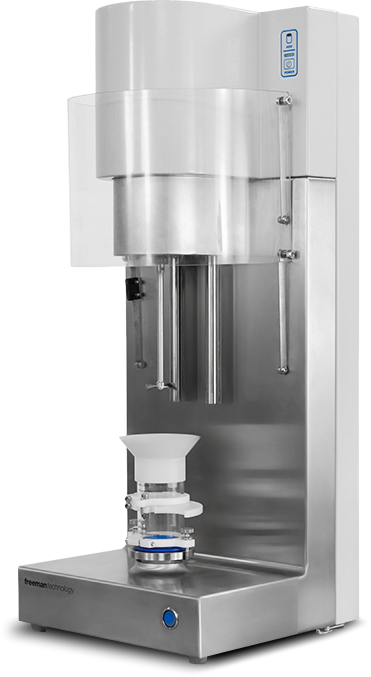
The FT4 was designed with one purpose in mind – to characterise the rheology of powders, or powder flow properties. This remains a primary function today, but the instrument, accessories and methodologies have been continuously developed to the point where the FT4 is now considered a universal powder flow tester.
It differs from other powder testers in many ways but when assessing industrial value, three features are critical:
The FT4 is a truly universal powder flow tester, with four categories of methodologies, defined as Bulk, Dynamic Flow, Shear (in accordance with ASTM D7981) and Process.
The FT4 employs unique technology for measuring the resistance of the powder to flow, whilst the powder is in motion. A precision ‘blade’ is rotated and moved downwards through the powder to establish a precise flow pattern. This causes many thousands of particles to interact, or flow relative to one another, and the resistance experienced by the blade represents the difficulty of this relative particle movement, or the bulk flow properties.
Excellent reproducibility and sensitivity, this is achieved by moving the blade in a precise and reliable way. The advanced control systems of the FT4 accurately set the rotational and vertical speeds of the blade, which defines the Helix Angle and Tip Speed.
The dynamic principle of the FT4 requires that the blade rotates and moves vertically, both downwards and upwards.
As a result, it will experience a resistance to rotation and a resistance to vertical movement.
The FT4 measures both rotational and vertical resistances, in the form of Torque and Force, respectively. Both signals need to be measured, as it is the composite of these two signals that quantifies the powder’s total resistance to flow.
Excluding either Torque or Force signals would result in misleading data, as the calculated Flow Energy value would not represent the powder’s total resistance to flow.
Due to the rotational nature of the technique, approximately 90% of the total resistance is contributed from the Torque signal, with the remaining 10% from the Force component.
This highlights the importance of measuring Torque as well as Force when evaluating rheological properties.
The behavior of the powder influences the electrode manufacturing in both wet...
+Additive Manufacturing (AM) relies on precise powder performance to ensure consistency and...
+Powder coatings are environmentally friendly as they eliminate solvent use and volatile...
+Powder processing involves various conditions, from high compaction stresses in hoppers to...
+Toner formulations, often proprietary, are milled into fine powders with sizes <10...
+Cosmetic compacts, made from blends of emollients, pigments, fillers, and binders, must...
+Dry powder pressing is a flexible and cost-effective method for making ceramic...
+In the food and nutraceutical industries, understanding powder properties and flow behavior...
+Powder processing is crucial in pharmaceutical manufacturing, where controlling powder behavior enhances...
+| FT4 Powder Rheometer intended for use in a laboratory environment for measuring the rheological properties of powders, pastes and semi-solids. Complies with the following EMC specifications and ASTM International standards: |
Certificates of conformity available on request. |
| Force |
|
| Torque |
|
| Vertical travel | 185mm |
| Rotor speed | 120 rpm maximum |
| Axial speed | 30 mm/sec maximum |
| Residual energy level in air | < 2mJ |
| Working zone | 316 stainless steel |
| Contact parts |
|
| Main instrument | 306 x 306 x 760mm |
| Main instrument | 22kg net |
| Supply voltage range | 90 to 264VAC |
| Input current range |
|
| Input frequency range | 47Hz to 63Hz |
| Minimum fault protection limit | 30mA |
| Humidity range | 20-80% non-condensing |
| Temperature range (operating) | 10˚C to 40˚C |
| Temperature range (storage) | 0˚C to 50˚C |
| Precision bore, borosilicate glass tube. | Standard sizes:
|
| Hardened stainless steel | Standard sizes:
|
Provided specifications were valid as taken from available documents at time of publication. These specifications may change without notice and are only provided as a general reference
Request a quote or talk to an expert for more information
to stay connected to product news, software updates, and the latest scientific resources
Copyright © 2025 Micromeritics Instrument Corporation